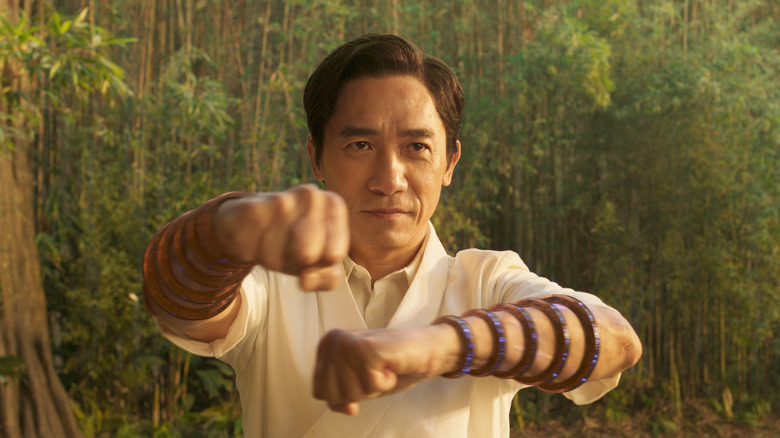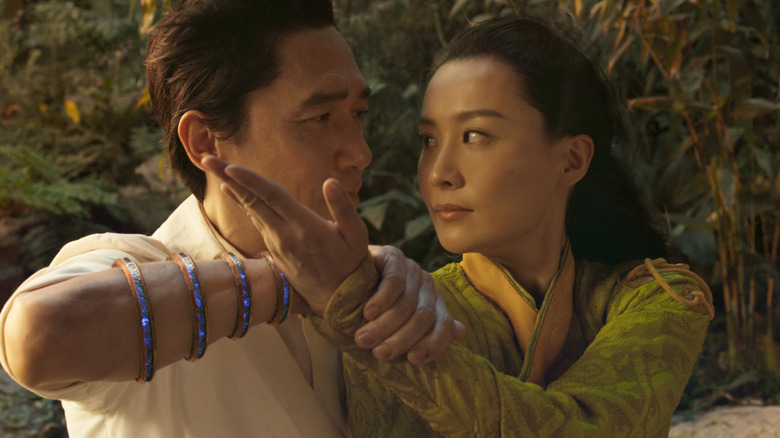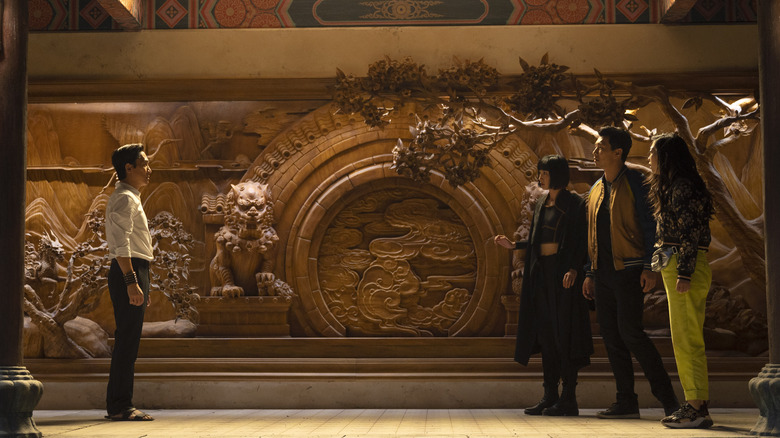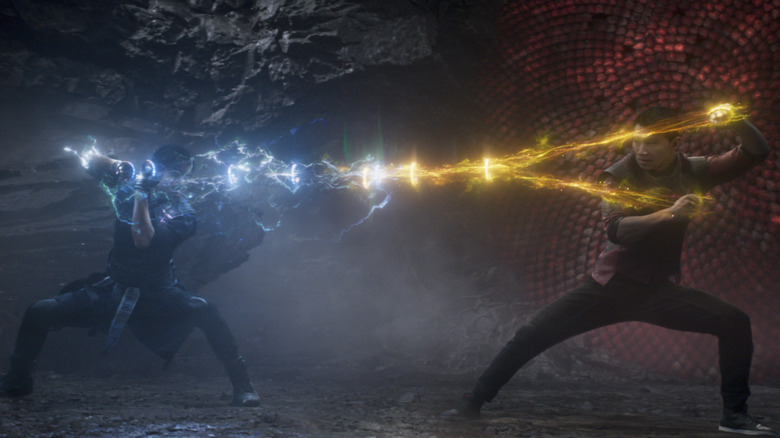Tony Leung's Wenwu Is Marvel's Best Villain Yet — Why This Helps And Hinders Shang-Chi
(This article contains spoilers for "Shang-Chi and the Legend of the Ten Rings.")
"Shang-Chi and the Legend of the Ten Rings" made history when it hit theaters this past weekend to a roaring success. Not just for being Marvel's first Asian superhero film, or that it is a tentpole lead by an entirely Asian cast. It's historic for being the Hollywood feature film debut of Hong Kong cinema legend Tony Leung.
Leung has been working in the Chinese movie industry for nearly four decades now and has been a screen icon for nearly as long. He's starred in internationally acclaimed classics such as "In the Mood for Love," Hong Kong action flicks like "Infernal Affairs" and "Hard Boiled," and wuxia hits like "Hero." He's one of our greatest working screen talents and a beloved icon of Hong Kong cinema. And he completely steals the show in "Shang-Chi and the Legend of the Ten Rings."
"Shang-Chi" could almost be described as a two-hander between Simu Liu's Shang-Chi and Leung's Wenwu. Wenwu is the estranged father of Shang-Chi, the immortal conqueror who trained Shang-Chi to be an assassin from childhood, and now sics assassins on his son to retrieve a precious pendant that had once belonged to his dead wife, Ying Li (Fala Chen). A very loose amalgamation of both Marvel characters the Mandarin and Fu Manchu (yes, that Fu Manchu), Wenwu is presented as the villain of Shang-Chi's story: a ruthless warrior who would stop at nothing to gain more power.
And yet. Wenwu arguably becomes the most sympathetic character in "Shang-Chi" — not just by the strength of Leung's frequently tear-filled eyes, but by the film's dedication to playing out Wenwu's story alongside Shang-Chi's. Wenwu certainly has the fullest arc, going from ruthless conqueror to tragic romantic hero, to deadbeat dad, to redeemed antihero. And while this easily makes him the best Marvel villain outside of Loki (who only received some of his best characterization after his debut film), it also creates an unusual problem for "Shang-Chi": the titular superhero gets completely overshadowed.
The Man Who Can Speak With His Eyes
First, we need to speak about the significance about casting the Tony Leung in "Shang-Chi." He's been one of the most beloved figures of the Hong Kong movie industry since the 1990s, and not just because he's devastatingly handsome. Leung's hooded eyes which frequently betray the roiling emotions beneath his placid surface, and his impeccable jawline that appear to be sculpted by the gods, have led him to be cast as many a romantic hero throughout his career, often in the films of frequent collaborator Wong Kar-wai, the filmmaker behind stone-cold classics "In the Mood for Love," "Chungking Express," and more.
But his subdued, naturalistic acting style — at odds with the outsized performances of many of his colleagues — led him to become rightfully embraced as one of the greatest screen talents of his generation. In China, he's been dubbed "The Man Who Can Speak With His Eyes," a testament to how expressive Leung is. It's a talent that Leung has been honing since his first breakout feature film, in Hou Hsiao-hsien's 1989 Taiwan-set drama "A City of Sadness," in which he played a deaf and mute character — leaving him only with only his eyes as his main tools. Throughout his seven-film collaborations with Wong, he honed his techniques until they were practically invisible — he became the characters, and every action became instinct rather than performance.
"Even when you leave it behind, it has become a part of you. It's inside you forever," Leung has said.
So it's no surprise that Leung gave so much of himself even to a Marvel villain that has such a problematic history. "He infused everything with love which was surprising," director Daniel Destin Cretton said of Leung. "I asked him in the middle of shooting whether he thought Wenwu truly loved his kids and he didn't hesitate. He said he has always loved his kids he just has no idea how. That was a really big epiphany for me."
Wenwu: Villain or Tragic Antihero?
"Shang-Chi and the Legend of the Ten Rings" opens not with the story of Simu Liu's Shang-Chi, but with the tale of Tony Leung's Wenwu, an immortal conqueror who discovered the mystical Ten Rings hundreds of years ago and wielded them to fell empires and build his own: the clandestine Ten Rings organization. But, as the mysterious narrator reveals, by the '90s, Wenwu had found that there were no more worlds left to conquer ... except for the otherworldly. Wenwu becomes obsessed with the hidden mystical village of Ta-Lo, which is said to guard the entrance to the divine world.
We learn that this mythic story is being told by none other than Shang-Chi's mother, Ying Li (Fala Chen), who had met and fallen in love with Wenwu when he tried and failed to enter Ta-Lo. Their first meeting is right out of an epic love story — they trade blows and longing glances in tandem, until the sequence becomes one of the most sexually charged scenes in the Marvel Cinematic Universe. Leave it to Tony Leung to bring (a sorely-needed) sex appeal to the MCU.
We gradually learn, through a combination of flashbacks and exposition, that Wenwu convinced Li to leave her village and, in turn, give up the Ten Rings to go straight. They're even happy, for a time. But tragedy strikes when a vengeful rival gang murders Li and pulls Wenwu back into the criminal underworld. Wenwu's soul is blackened by revenge and it starts to infect his young son and daughter, until they both run away. It's not until Shang-Chi (Simu Liu) and Xialing (Meng'er Zhang) reunite as adults that the scars of their childhood brought on by Wenwu's suffering become clear.
Or does it? The film seems to waver between casting Wenwu as the outright villain or the tragic antihero — is he the cold, calculating leader of a terrorist organization, or simply a bad dad mourning the loss of his wife? He's a little bit of both, thanks to Leung's intensely charismatic and sympathetic performance, which — unfortunately for the film — is leagues above anything that Simu Liu is doing.
Not Your Everyman
"Shang-Chi" goes out of its way to prove that Simu Liu's titular hero is an everyman. He works as a hotel valet with his best friend Katy (Awkwafina), he sings karaoke until the late hours, he's funny and self-deprecating, and maybe suffering from a little arrested development. And to his credit, Liu is great at playing the everyman, drawing from his comedy background to radiate a boy-next-door likability in the first half of the film, which plays out more as a fish-out-of-water story/buddy comedy than the epic tragedy that is unfolding over on Wenwu's side. But as soon as the two meet, "Shang-Chi" morphs into the epic martial arts movie that it had been all along. And that's where Liu starts to feel lost, especially when up against Leung.
Marvel does not lack for subpar villains — most of the rogues the heroes go up against are either "exactly like the hero, but EVIL" or "kind of has a point, but loves MURDER." Wenwu falls somewhere in the middle here, except he has one foot up — he's got Tony Leung's charisma. Leung manages to convey the turmoil that Liu can't, simply by virtue of those beautiful, expressive eyes. Eyes that have had whole academic dissertations and video essays on them. Eyes that convey the loneliness of a centuries-old man who had finally found the love of his life, only for her to be ripped away. Eyes that flutter at the dinner table where he and his children awkwardly sit, unable to convey how much he has missed them, and how much he still resents them for his wife's death. Eyes that become laser-focused as an evil force convinces Wenwu that his dead wife is trapped behind a gateway guarded by Ta-Lo, punished for falling in love with him. Poor Simu Liu and his three expressions could not stand a chance.
Hero Besting Heavy
By the end of "Shang-Chi," Shang-Chi has come to the conclusion: he must kill his father to stop his devious plan of destroying Ta-Lo. Except Wenwu's devious plan is only driven by despair and grief, something that is all too universally understandable. Wenwu's biggest sin in this case, is that he's misguided, and Shang-Chi has decided that the only way to stop him will be to fulfill the assassin training that he had run away from, and murder his father. Of course, he doesn't kill him, and Wenwu's self-sacrifice for his son ends his arc in antihero territory. It's a rich and emotionally complex character arc for Wenwu, but a confusing one for Shang-Chi. How did he grow? What were the lessons he learned? Not to murder, at least.
As Al Pacino says in Quentin Tarantino's "Once Upon a Time in Hollywood," Marvel pulls the "oldest trick" in the book by casting Hong Kong movie legend Tony Leung against up-and-comer Simu Liu in "Shang-Chi."
"You got a new guy...you want to build up his bonafides," Pacino's producer Marvin Schwarz says in the 2019 film. "So you hire a guy from the canceled shows to play the heavy. Then at the end of the show when they fight, it's hero besting heavy."
Marvel probably didn't mean any ill intent by raising up their new Asian superhero by cutting down one of the finest actors to come out of the Chinese film industry, but rather probably intended it as a sort of passing of the torch. What better way to prove Liu's acumen as Shang-Chi then to pit him against the Tony Leung, right? Even if he doesn't defeat him, necessarily, Shang-Chi comes out of their fight better and more morally superior than his father. But somehow, in the mere 30 or so minutes of screentime that Leung had, Wenwu comes out as the more interesting, rich, and compelling character — surrounded by tragedy of both his own and others' makings — while Liu more or less stumbles into the role as the wielder of the Ten Rings.
But at least now he gets to be an Avenger and sing karaoke with Wong.



